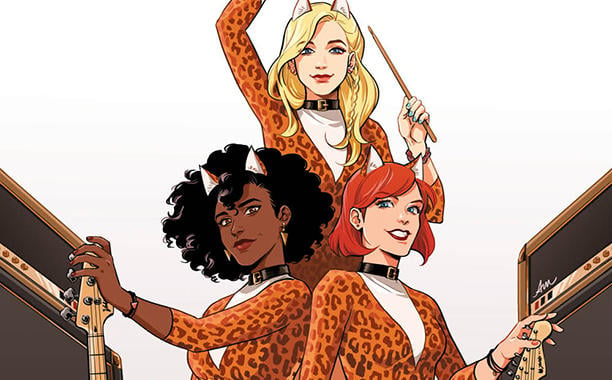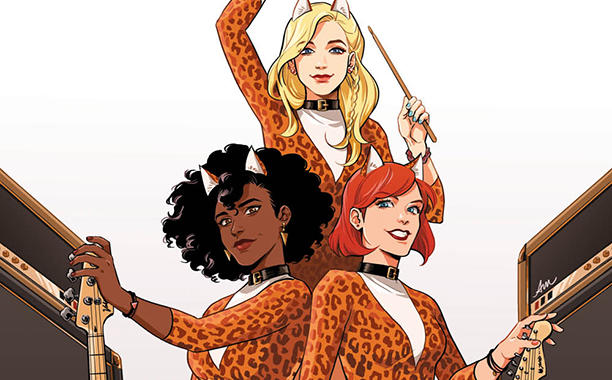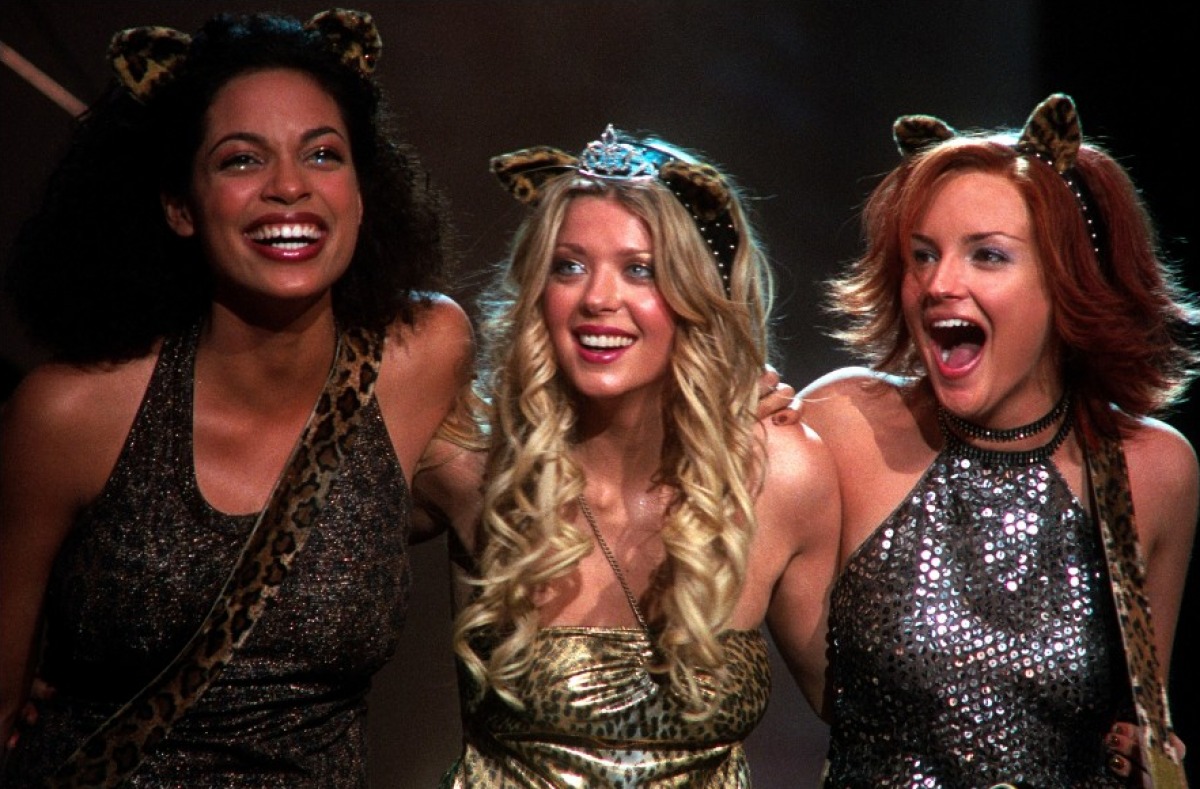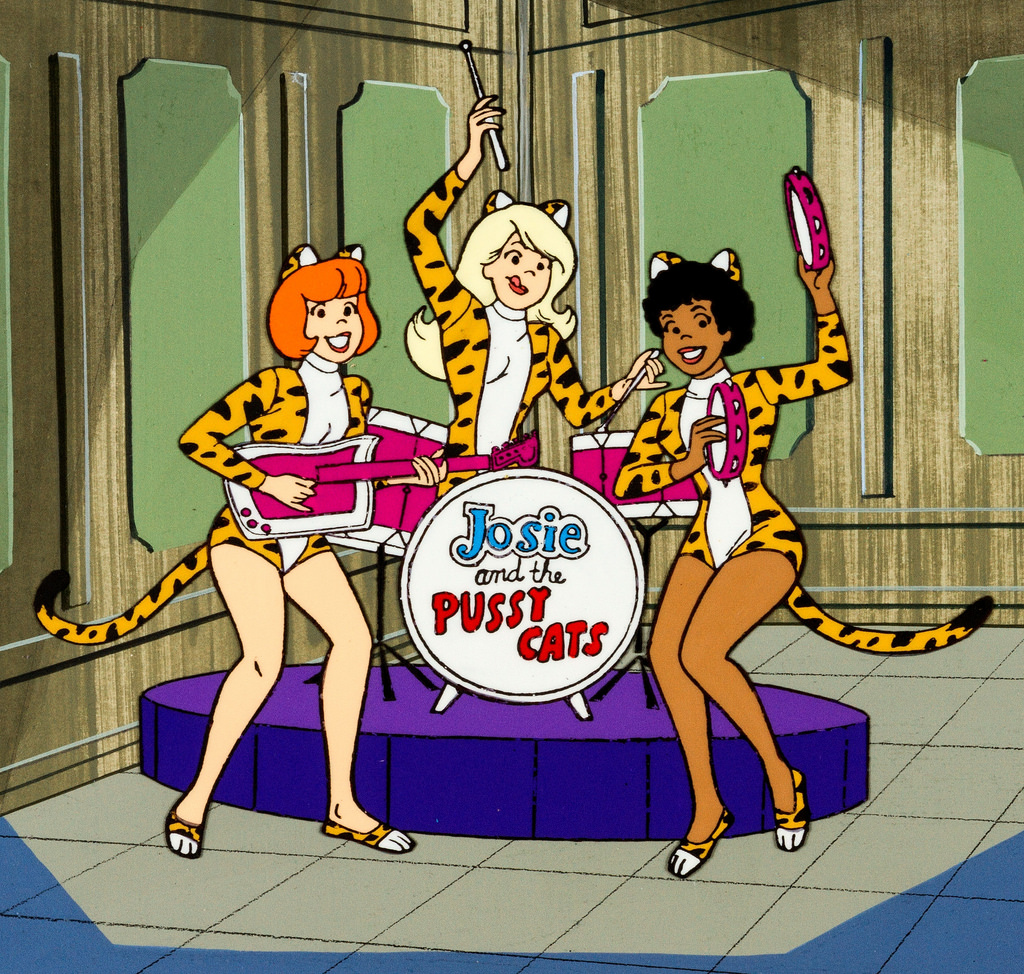Archie Comics recently announced it would be relaunching one of its most popular titles, and the Internet rejoiced. There’s something about Josie and the Pussycats that makes it just as lovable as the Riverdale gang and Sabrina, if not more so, and that affection is justified. Josie McCoy, scientifically-minded and tomboyish Valerie Brown, and ditzy (yet occasionally brilliant) blonde Melody Valentine lived typical teenage lives—aside from their musical stardom and occasional brushes with mystery and the supernatural. From 1963 till the early eighties, Josie and the gang were on the road and around Riverdale, charming readers with their madcap adventures.
The three girls remained remarkably relatable throughout; sure, fans couldn’t necessarily identify with solving capers on cruises or discovering cursed monkey’s paws, but they could understand what it was like to decide between competing love interests and stay true to friendships in troubled times. Were the band’s “troubled times” unbelievable, given that they included teen rock-star status and general kookiness? Absolutely. But that was what made the stories so appealing—appealing enough for a borderline-surreal Saturday morning cartoon, innumerable one-off stories in Double Digests for decades after the comic was canceled, and a brief revival in the nineties that saw the girls’ adversary Alexandra Cabot transform into a fish. (“Surreal” applies to more Josie stories
than one might think.)
Despite the Pussycats’ popularity, little fanfare was made about everyone’s favorite girl group until the premiere of 2001’s Josie and the Pussycats, a sharp, satirical film that put Josie, Valerie, and Melody at the center of a record company-run brainwashing conspiracy. Though the snark dosage was much higher than previous Josie incarnations, the movie still memorably captured the spirit of the comic. The songs were ludicrously catchy, the villains were nothing short of cartoonish, and the girls’ friendship was emphasized above all else. The mantra of “Friends first, band second” may be cheesy, but it’s such a strong reflection of the comic when mixed with Josie’s budding romance with Alan M., Alexandra’s undying envy of the girls, Alexander’s incompetence as band manager, and the utter evilness of the villains’ plotting.
The biggest change to the comic’s original ethos—the addition of metanarrative, with references back to the fact that, yes, this is a movie based on a comic—actually enhanced the film’s appeal. This may have felt like a radical idea at the time, but it’s borderline pervasive now, popping up on TV, in movies, and in comics. Characters like Deadpool, who epitomizes accessible metanarrative with his constant references to comic book tropes, have come into the public consciousness, and while Josie and the Pussycats didn’t get the popularity or affection it warranted at the time, were it to premiere today, far more people would be paying attention.
Now, over a decade later, there’s a dedicated Josie fanbase that’s never stopped quoting the movie or lusting after the leopard-print costumes, long tails, and ears for hats. With Archie and the gang getting their revamp through comics industry darlings like Fiona Staples and Chip Zdarsky, it only seems right that the nostalgia for the simplicity of Riverdale extend further.
One of the beautiful things about Archie Comics is they’ve always had appeal across all age groups. Part of that has to do with their characters’ longevity; the kids at Riverdale High have gone through many artists and eras, but their sensibilities have remained the same. And part of that is the wholesome simplicity of Archie’s world. Archie, Sabrina, and Josie are all average teens thrust into occasionally extraordinary circumstances with no worries of supervillains or global crises. They’re just the kinds of friends every kid longed for, and thus loved spending time with. The current Archie and Sabrina reboots are in tune with that. Though they’re able to put names to things that would’ve gone unspoken in the 1960s—Jughead’s asexuality, for one, or Kevin’s openly gay status—these aren’t edgy comics. With their mix of absurd comedy and sincerity when it comes to friendships and relationships among teens, they’ve never needed to be. Both factors were likely taken into consideration when Marguerite Bennett and Cameron DeOrdio were appointed as co-writers on the new Josie series; Bennett’s received GLAAD recognition for her previous work and writes DC Bombshells, while DeOrdio waxed poetic about the specific brand of fun Josie and the girls bring to Entertainment Weekly, “with a focus on friendship and joy and music.” (Series artist Audrey Mok has several Archie Comics variant covers on her resume.)
Whether the new wordsmiths and artist mix in some metatextual references or simply harken back to the surreal humor of decades past (or both!), we’re going to get the Josie and the Pussycats we deserve—the one we’ve longed for since the regular comics drew to a close and the movie slipped out of theaters. For years now, fans have been ready to revisit their favorite punk rock prom queens, and there’s no time like the present.
Christy Admiraal lives in Manhattan, where she works as a copywriter and editor. She enjoys comedy podcasts, graphic t-shirts, inserting her cats’ names into popular song lyrics, and tweeting an excessive amount@AdmiralChristy.
—The Mary Sue has a strict comment policy that forbids, but is not limited to, personal insults toward anyone, hate speech, and trolling.—
Follow The Mary Sue on Twitter, Facebook, Tumblr, Pinterest, & Google+.












Published: Jun 13, 2016 03:00 pm